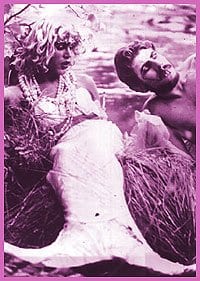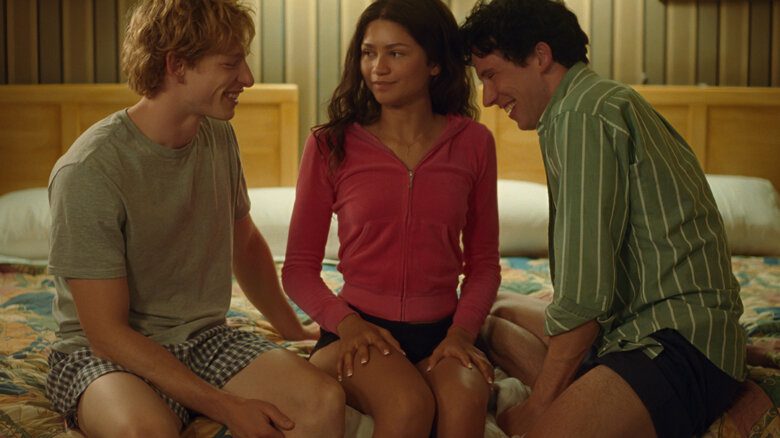The late Jack smith was a major personality within New York’s downtown art scene from the 1950s until his death from AIDS in 1989. He was probably best known for his monumentally provocative 1963 film Flaming Creatures. Screenings provoked riots in Belgium, seizure by authorities in New York and the wrath of the late segregationist Senator Strom Thurmond. In many ways, Flaming Creatures proved a difficult act to follow – not that Smith wasn’t prolific in his own way.
Pleasure Dome presents two evenings of experimental films and performance-documentations by Smith. The program’s title, courtesy of an essay by San Francisco-based queer filmmaker and film scholar Jerry Tartaglia, is The Perfect Queer Appositeness Of Jack Smith.
Tartaglia, who has taken on the daunting task of restoring many of Smith’s films (and who will be unable to attend this program as planned), adapted his title from Smith’s own essay “The Perfect Film Appositeness Of Maria Montez,” published in Film Comment in 1962. This queen of Technicolor, perhaps best known for her role in the ’40s classic Cobra Woman, was Smith’s favourite fabulous failure, his B-movie goddess.
Smith, like many before and after Stonewall queer gentlemen, loved strong and intelligent Hollywood actresses. But usual suspects like Davis and Crawford or even Garbo and Dietrich were too stock. For Smith, Montez personified a precarious boundary between bad acting and star presence, between tawdry excess and immaculate perfection. Montez was definitely camp, but too obscure for Susan Sontag’s seminal essay “Notes On Camp.”
Smith also differed from his straight experimental male contemporaries in his attitude to Hollywood. Tony Conrad, Hollis Frampton and Jonas Mekas all avoided trappings of the dominant culture. Actors signified Hollywood or, even worse, theatre. Smith was a bad seed brother to fellow queers Kenneth Anger and Andy Warhol. He was fascinated by stars and their aura and saw no reason why his non-actor friends couldn’t be stars. According to experimental film aficionado Fred Camper, the ludicrous acting in Normal Love, Flaming Creatures and other Smith film stemmed from a belief that performers could literally become their fabulous costumes.
Like Anger and Warhol, Smith was quite the voyeur. But Smith was arguably more performer than film director. Or rather, he refused to separate these and other functions. He presented performances at his own duplex loft on Greene St – The Plaster Foundation. These performances were pitched somewhere between ritual and rehearsal. Inevitably, his film stocks themselves became performance canvases or backdrops. He created startling effects by mixing up recorded images on film and slides, and by making live splicing a central component of his performances.
In the mid 1980s, Jack Smith spent considerable time in Toronto. He presented a week of performances at The Funnel experimental film theatre on King St W, attracting a menagerie of Funnel members and other quasi-anarchic scenesters. He held court briefly as Resident Mad Genius at Martin Heath’s predecessor to Cinecycle, the Grange Arts And Performance Space.
One infamous performance at The Funnel was The Brassieres Of Uranus. Willing participants wore weird cone-shaped brassieres over body parts not normally associated with these garments. Heath recalls obtaining not only the cello played by a nubile young musician during one of the performances, but also the authentic leopard skin worn by the star. Smith was fond of leopard skins and their spots. In I Was A Male Yvonne DeCarlo, King Jack reclines on his thrift-store throne, wearing a leopard-spotted suit appropriated from another one of his B-movie goddesses.
Flaming Creatures is 45 minutes of rococo delirium, shot in black and white and pushing the limitations of its film stock (it screens at 8pm on Fri, Jul 18). Smith and his conspirators begin by perfecting their lips while a how-to-apply-lipstick instruction record plays on the soundtrack. Smith’s favourite soundtracks were instruction records, cheesy Hawaiian instrumentals and the eternal Yma Sumac. Flaming Creatures went beyond any conventional drag troupe or even Charles Ludlam’s Ridiculous Theatre. These performers not only predated the Radical Faeries but made them look butch.
After the tempest surrounding Flaming Creatures, Smith retreated to the countryside to make a more accessible follow-up. The perversely titled Normal Love (8pm on Sat, Jul 19) was not completed during his lifetime, nor was it ever really meant to be officially completed. Like Smith’s other films and performances, it is linear only because the material is linear. Normal Love is not particularly accessible to anybody confused or offended by Flaming Creatures; it’s made, however, with gloriously coloured Kodachrome stock. Never before has nature seemed so ornamental.
Smith takes such delight in his idyllic surroundings that they too deserve their extended close-ups. Background and foreground distinctions become more than blurry, while both gender-fucking and mocking of the heterocentric gleefully run amok.
Smith’s Maria Montez obsession runs throughout Normal Love, with the predatory Cobra Woman character and the slinky reptile itself. And although his male performers more than identify with their female muses, they hardly reject their own anatomies. During the lipstick application tutorial in Flaming Creatures, one actor is heard wondering if lipstick smudges while sucking cocks. The answer, of course, is never when applied properly.
Jack Smith was very much of his time and his artistic milieu, but his influence today is pervasive. More than a few short films I watched during the recent Inside Out festival involved similar blendings of nature, artifice and delirious male bodies frolicking merrily. Damn the torpedoes, and screw the consequences.
*The Perfect Queer Appositeness Of Jack Smith: Flaming Creatures and other short works by Jack Smith screen at 8pm on Fri, Jul 18 at Cinecycle (129 Spadina Ave, down the lane). Normal Love screens at 9pm on Sat, Jul 19 outdoors in the west courtyard at 401 Richmond St W. Tix for either cost $5; call (416) 656-5577.

 Why you can trust Xtra
Why you can trust Xtra


